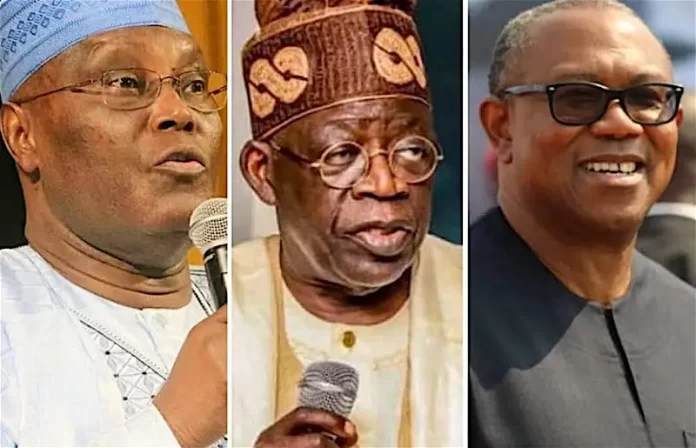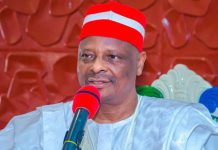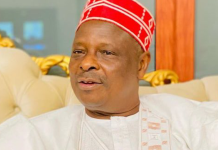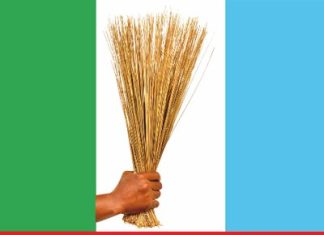Abuja — Alhaji Atiku Abubakar, the candidate for the Peoples Democratic Party (PDP), and Mr. Peter Obi, the candidate for the Labour Party (LP), filed separate challenges with the Supreme Court yesterday in an attempt to overturn President Bola Tinubu’s victory.
In their appeals, the two contenders asked the Supreme Court to overturn the judgement of the Presidential Election Petition Court (PEPC), which had declared All Progressives Congress (APC) candidate Tinubu the victor of the February 25 presidential contest.
They specifically claimed that Tinubu did not receive at least 25% of the votes cast in the Federal Capital Territory, or FCT, Abuja, and that the Independent National Electoral Commission, or INEC, erred in its ruling because it purposefully refused to send the poll results electronically to its portal in compliance with its regulations.
In spite of their strong evidence, they further said that the PEPC ignored their allegations of election manipulation, which were carried out in violation of the electoral statute and the constitution.
While Obi, using a group of attorneys headed by Dr. Livy Uzoukwu, SAN, filed 51 grounds of appeal before the supreme court, Atiku, using his coalition of 67 attorneys, which included 18 Senior Advocates of Nigeria under the direction of Chief Chris Uche, SAN, filed 35 grounds of appeal to contest Tinubu’s victory.
Atiku: The PEPC verdict represents a serious injustice.
In particular, Atiku contended in his appeal that the ruling of the five-member Court of Appeal panel, presided over by Justice Haruna Tsammani, which dismissed his petition contesting the results of the presidential election on September 6 was not only “against the weight of evidence,” but also constituted a grave injustice against him.
Even after evidence was presented to the PEPC panel demonstrating that the Independent National Electoral Commission, or INEC, had violated existing laws and regulations governing election conduct, the former vice president insisted that the panel had erred in law by failing to declare the presidential election null and void on the grounds of non-compliance with the Electoral Act, 2022.
He charged that the Electoral Act of 2022 and the 1999 Constitution, as amended, were grossly misconstrued and misrepresented in order for the PEPC to reach its unanimous conclusion.
In his own words, “The lower court committed a legal error when it declined to support the Electoral Act of 2022’s mandated electronic transmission of results for final results verification and confirmation, which is necessary to ensure transparency and integrity of results in line with the Act’s principles.”
willful disregard for election regulations
He contended that the use of the Bimodal Voter Accreditation System, or BVAS, machines for the electronic transmission of election results from polling places to INEC’s collation system for the verification, confirmation, and collation of results before announcement was mandated by Sections 64(4) and (5) of the Electoral Act as well as INEC’s Regulations and Guidelines for the conduct of the election, which he tendered in evidence.
The results of the National Assembly election, which was held concurrently, were easily transmitted electronically, according to Atiku, who informed the top court that some of the presiding officers who personally operated the BVAS machines at polling places on election day had “confirmed the non-transmission of the presidential election results electronically from the BVAS machines” in their testimony before the PEPC.
Atiku continued, “The election result was significantly impacted by the nationwide circumvention of the use of the mandated verification technology, which affected all polling places and the collation of results throughout Nigeria.”
An error in the e-transmission of results was not explained by INEC.
Furthermore, he informed the court that Lawrence Bayode, the only witness for INEC, acknowledged that the Commission had encountered a technical issue that prevented the system from functioning on election day, “which technical glitch was not explained by the 1st Respondent.”
Furthermore, he contended that the INEC guidelines and rules had legal effect since they were a direct result of the Constitution and hence qualified as subsidiary legislation under Section 169(1) of the Constitution and Section 148 of the Electoral Act.
Atiku informed the supreme court that there was widespread non-compliance with the Electoral Act, affecting 176, 846 voting places nationally. He said that this had a significant impact on the election’s result.
“The case of the Appellants was that, by means of credible evidence, they established the First Respondent’s deliberate non-compliance with the electronic transmission of election results, which was nationwide, under the new legal regime of technology-based collation of results under the Electoral Act 2022.”
The justified expectation doctrine
“Based on the doctrine of legitimate expectation,” he claimed, the election’s result should have been declared invalid.
Mandatory FCT 25% requirements apply; Abuja is not the 37th state
Atiku contended that the constitutional requirement of one-quarter of the votes in two-thirds of the states and the Federal Capital Territory (FCT), Abuja, was an extra and necessary requirement to the rules pertaining to the highest lawful votes and, as such, a prerequisite to an INEC declaration.
The lower court’s interpretation of the aforementioned Federal Capital Territory (FCT), Abuja, as the 37th state of Nigeria is not consistent with the explicit stipulations of sections 2(2) and 3(1) of the 1999 Constitution.
“In interpreting the crucial word ‘AND’ in the aforementioned sub-section, the lower court failed in its obligation.
A presidential contender must receive at least 25% of the vote in the Federal Capital Territory, Abuja, according to Section 134(2)(b) of the Constitution.
In the appeal he filed with the PDP, Atiku went on to say, “There is no ambiguity or absurdity in the provision of Section 134 (2) (b) of the Constitution to warrant a resort to any other interpretation other than the literal rule as the lower court erroneously did.”
As a result, the appellants asked the supreme court to accept the appeal, overturn the PEPC’s decision, and provide their primary or supplementary remedies.
Among other things, he asked the Supreme Court to rule that Tinubu was not legitimately elected by the majority of valid votes cast in the election and to declare him ineligible to be named the victor.
Atiku asked the court to order a run-off between him and Tinubu or to declare the entire poll invalid and require INEC to conduct a new one, in addition to pleading with the court to proclaim him the legitimate victor of the election and order his inauguration as president. INEC, Tinubu, and the APC were listed as Respondents in the appeal.
Law was broken by PEPC – Obi
Obi, who finished third in the presidential election, argued in his own appeal that the PEPC panel made legal errors and came to the incorrect decision when it denied his plea.
He claimed that the panel misapplied its judgment in assessing the information he presented to it and committed a serious injustice when it determined that he had neglected to name the polling places in which irregularities had taken place during the election.
Obi and the LP also criticized the PEPC for rejecting their case on the grounds that they failed to provide specific numbers for the votes or scores that they claimed were manipulated or manipulated to favor President Tinubu and the APC.
They further charged that the panel headed by Justice Tsammani had committed legal errors when it excluded certain parts of the petition based on the First Schedule to the Electoral Act 2022 and articles 4(1)(d)(2) and 54.
Accusing the lower court of violating his right to a fair trial, Obi maintained that his witnesses’ evidence was improperly thrown out for lack of competence.
He claimed before the supreme court that his claim that INEC submitted 18, 088 blurry results to its IReV platform was unfairly rejected by the panel.
Furthermore, Obi claimed that the lower court disregarded his claim that the certified true copies of the documents, which stated that they were the CTC of polling unit results for the presidential election, that INEC had sent to his legal team included 8, 123 blurred results with blank A4 papers, pictures, and images of unidentified people.
“When they held and concluded that he failed to establish the allegation of corrupt practices and over-voting, the learned justices of the court below committed a legal error and caused a miscarriage of justice,” Obi continued.
By-passing its e-transmission rule, INEC
He claimed that the lower court erred in rejecting his claim that INEC disregarded its own rules by refusing to electronically transfer election results from polling places to the IReV by citing the legal doctrine of estoppel.
“The petitioners presented strong and convincing evidence, both oral and documentary, demonstrating the Respondents’ material non-compliance with the Electoral Act 2022 in the way the election was conducted.
The Appellants claimed that the panel erroneously rejected the claim of double nomination made against Tinubu’s vice president, Kashim Shettima, and that “the court below overlooked that the Respondents failed to disprove the evidence of substantial non-compliance adduced by the petitioners.” Tinubu was charged with drug-related offenses and fined $460,000.
Similarly, Obi said that the PEPC disregarded proof proving President Tinubu was previously charged with a narcotics offense in the United States and fined $460,000.
In his appeal, Obi added, “Imposition of a fine is not limited to a criminal conviction, as the word, in law, includes a civil forfeiture.”
LP: The reason we’re at S-Court
The Labour Party announced yesterday that it has decided to contest Tinubu’s election at the highest court because it believed the lower court had made legal and factual errors in reaching its decisions. This was said in a statement released by the party’s national publicity secretary, Obiora Ifoh.
Ifoh stated: “The 51 grounds are regarded as a legal error as the party’s legal team aims to prove that Bola Tinubu, the APC’s presidential candidate, did not win the election and that it was incorrect for the PEPC and INEC to declare him the victor when numerous indisputable evidence pointed to the contrary.
“Obi and the Labour Party are requesting four main things from the Supreme Court: Permit the appeal, overturn the PEPC’s erroneous ruling, and provide the relief requested in the petition, either in full or in part.
Regarding the 25% requirement for Abuja, Obi and the Labour Party enumerated the specific details of the PEPC’s inaccuracy as follows:
“That the PEPC neglected to recognize that in order for the President to take office or hold the position of President, he must also obtain 25% of the votes cast in the Federal Capital Territory.
Additionally, they charged that the PEPC had failed to consider the greater significance of Section 299, which would become clearer upon a careful reading of Section 301 of the Constitution.
Join Television Nigerian Whatsapp Now
Join Television Nigerian Facebook Now
Join Television Nigerian Twitter Now
Join Television Nigerian YouTUbe Now





